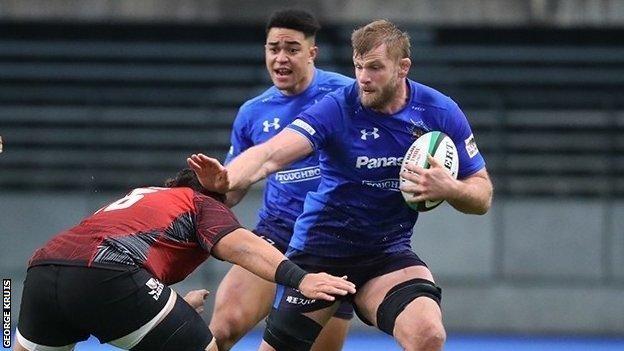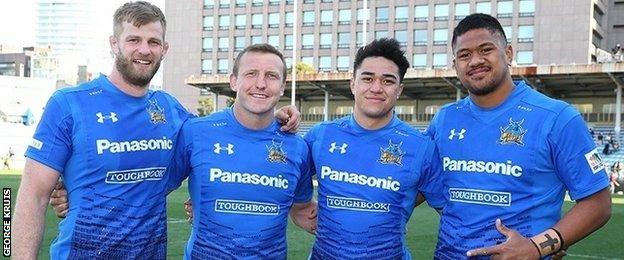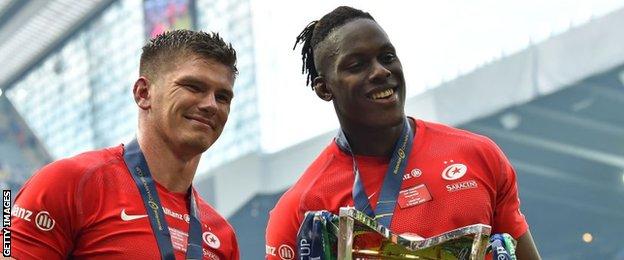
Around the start of 2019, George Kruis asked England coach Eddie Jones for a private word.
At a time when most players were wondering whether they would go to Japan for that year's Rugby World Cup, Kruis wanted to talk about something more long term.
He wanted to know Jones' opinion on making Japan his home.
"When you bring up the topic, you don't really know which way a coach is going to go," the former Saracens second row told BBC Sport.
"But I knew Eddie would be honest. He was really complimentary about a move to Japan.
"He's a person who sees a bigger picture. He sees the benefit of players opening their mindset, of not just having lived in north and south London all their lives."
Kruis, born in Surrey, latterly of St Albans, certainly doesn't now.
The 31-year-old's new club - Panasonic Wild Knights - are based in Ota, a small city of a quarter of million people 50 miles north of Tokyo.
When he decided to leave Saracens, he wanted adventure. There were offers from France, but none had the allure of Japan and its unique Top League.
Just as he did most of the time with Saracens and England, Kruis is still winning. Panasonic Wild Knights are five from five so far this season but while the results may be similar, the game is different.
"It is a lot more fluid, there is a lot less kick tennis," says Kruis, who has dropped around half a stone in weight as he fits into a more open style of game with leaner forward packs.
"There is a bigger emphasis on attack and creating space. At England and Saracens, I used to do a lot of dog work. You had the likes of Billy [Vunipola], Maro [Itoje] and Mako [Vunipola] who would do the majority of the ball-carrying while I got round and picked up the scraps.
"Here it is more free flowing, so you get different types of opportunities."
The chance to run in interception scores - as Kruis did in the 47-0 win over Canon Eagles - certainly wasn't common in England.
But more than a change of playing style, Japan is a change of lifestyle.
"'Ramen o tabemasu' which means 'I will eat Ramen'" replied Kruis when asked what vocabulary his weekly Japanese lessons had given him so far.
"Fortunately a lot of the technical rugby words - line-out, scrum and the like - are pretty much the same so you try and use as many of those as you can."
Playing rugby in Japan means entering a corporate environment as well as a sporting one, though. Each Top League side is essentially a works team for one of Japan's global brands.
Panasonic's fellow electronics giants Toshiba, Sanyo and Ricoh, car-makers Honda and Mitsubishi, steel producers and whisky distillers all field top-flight teams.
And the mix of players is unlike anything else in the world.
There are a few global superstars: New Zealand's two-time World Player of the Year Beauden Barrett is at Suntory Sungoliath; Australia captain Michael Hooper plays for Toyota Verblitz; Kruis' old Saracens team-mate and former European player of the year Alex Goode has moved to NEC Green Rockets.
The majority of the Japan squad that made the quarter-finals of the last World Cup play in their domestic league.

And the rest of the dressing rooms are made up of 'workers'; employees who represent the company in the office as well as on the pitch.
"I was surprised at how well it gelled," said Kruis. "Everyone gets on quite seamlessly.
"The culture is different in terms of hierarchy and respect.
"In wider Japanese society you have the concept of senpai and kohai, 'elder and younger' and there is that sort of dynamic in the team. It filters through from the culture.
"You have to encourage people to speak, to give feedback to get the opinions of everyone.
"It is not a bad thing, but it is interesting to observe. And Panasonic really look after people off the field so it has been easy to fit in."
Playing among the workers has given Kruis space to think about his own career.
The Top League usually runs for a little more than four months. Two seasons, as Kruis plans, of lighter workload may help the forward extend his playing days.
Beyond that, it also frees up his time to concentrate on the sports nutrition business he started with Saracens team-mate Dominic Day in 2018.
While Day works on the business - named FourFive after their shirt numbers - in London, Kruis puts in the hours on the other side of the world. Together they are building their post-playing futures.
It's working for Kruis. Would it work for other England stars?
The Top League chairman Osamu Ota name-checked Kruis' former Saracens team-mates Owen Farrell and Itoje as players he would like to bring to Japan in a recent interview with the Daily Telegraph.
"A fair few people from home have got in touch asking questions about the Top League," Kruis added.

"They are interested. People are intrigued by it and how it might work with family.
"Japan need to keep building on the success. They can't flood it with foreign players, but the experience is worth having and it rubs off on the rest of the team. I'll be interested to see where they take it from here."
Kruis has already made one English import of his own.
"I got my Mum to send me over a really good Christmas pudding in December," he said.
"That was an absolute treat and not something you would ever get over here."
Until recently, you could have said the same about England players like Kruis playing their club rugby in Japan.


Source: BBC Rugby Union News
